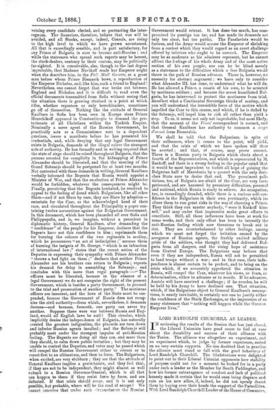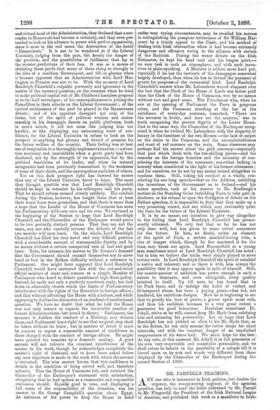LORD RANDOLPH CHURCHILL AS LEADER.
IN reviewing the results of the Session that has just closed, the Liberal Unionists have good cause to feel at ease about the durability and success of their alliance with the Tories. The alliance was altogether an experiment, and an experiment which, to judge by former experience, rested on no very certain supports. No one doubted that in practice the alliance must stand or fall with the good behaviour of Lord Randolph Churchill. The Gladatonians were delighted to point out to their Liberal Unionist opponents how stability of purpose could not for a moment be looked for in a party under such a leader as the Member for South Paddington, and how his former extravagance of conduct and lack of political honesty made it certain that he would soon bring disgrace and ruin on his new allies, if, indeed, he did not openly desert them by buying over their heads the support of the Parnellites. With Lord Randolph Churchill Leader of the House of Commons, IN reviewing the results of the Session that has just closed, the Liberal Unionists have good cause to feel at ease about the durability and success of their alliance with the Tories. The alliance was altogether an experiment, and an experiment which, to judge by former experience, rested on no very certain supports. No one doubted that in practice the alliance must stand or fall with the good behaviour of Lord Randolph Churchill. The Gladatonians were delighted to point out to their Liberal Unionist opponents how stability of purpose could not for a moment be looked for in a party under such a leader as the Member for South Paddington, and how his former extravagance of conduct and lack of political honesty made it certain that he would soon bring disgrace and ruin on his new allies, if, indeed, he did not openly desert them by buying over their heads the support of the Parnellites. With Lord Randolph Churchill Leader of the House of Commons,
and virtual head of the Administration, they declared that a sur- render to Home-rule had become a certainty, and they even pre- tended to look on his advance to power with perfect equanimity, since it must in the end mean the destruction of the hated " Dissentients." It is not to be wondered at if the Liberal Unionists, judging from the past, felt keenly the danger of the position, and the possibilities of fulfilment that lay in the sinister predictions of their foes. It was as a means of obviating these perils that many of them clung so strongly to the idea of a coalition Government, and felt so gloomy when it became apparent that an Administration with Lord Har- tington as Premier was not to be. With the memory of Lord Randolph Churchill's culpable perversity and ignorance in the matter of the currency question, on the occasion when he tried to make political capital out of Mr. Childers's harmless proposal as to the half-sovereigns ; of his unscrupulousness in joining the Parnellites in their attacks on the Liberal Government ; of the cynical recklessness of the part he played in the Maamtrasna debate ; and of his apparent disregard not only of the forms, but of the spirit of political wisdom and states- manship in his demagogic dances on public platforms, fresh in men's minds, it did not seem like judging him too harshly, or like displaying any unbecoming want of con- fidence, for the Liberal Unionists to refuse to look on the prospect as anything but gloomy and devoid of promise for the future welfare of the country. Their feeling was at best one of resignation to a thoroughly unpleasant situation,—a si tua- tion necessary and unavoidable when a great party had been shattered, not by the strength of its opponents, but by the political fanaticism of its leader, and when its natural antagonists had been previously demoralised by the weakness of some of their chiefs, and the unscrupulous ambition of others.
Yet on this dark prospect light has dawned far sooner than any of the Liberal Unionists dared to hope. The most they thought possible was that Lord Randolph Churchill should be kept in restraint by his colleagues and his party. That he should reform seemed utterly unlikely. His conduct during the Session, however, has taught them that at least their worst fears were groundless, and that there is more than a hope that the Leader of the House of Commons has sown his Parliamentary wild-oats once and for ever. We ventured at the beginning of the Session to hope that Lord Randolph Churchill and the Chancellor of the Exchequer would prove to be two perfectly distinct persons. That they are not the same, any one who carefully reviews the debates of the last two months will soon learn. On the whole, Lord Randolph Churchill has filled his very novel and very difficult position with a considerable amount of statesmanlike dignity, and by no means without a certain unexpected vein of tact and good taste. Take, for instance, his answer to Mr. Cremer's demand that the Government should commit themselves not to move hand or foot in the Balkan difficulty without a reference to Parliament. One might have supposed that Lord Randolph Churchill would have answered this with the cut-and-dried official mixture of sneer and censure at a simple Member of Parliament who dared to debate questions of high State policy. Instead, he made not only a perfectly courteous reply, but laid down in admirably chosen words the limits of Parliamentary interference with the rights of the Executive in foreign affairs ; and this without affronting the House with a lecture, and while appearing to declinethe discussion of an academic Constitutional question. We have no doubt that what he told the House was not only correct as regards the invariable practice of former Administrations, but sound in theory. Parliament, the moment it dislikes the conduct of a Ministry, may dismiss them, and Parliament has a right to see that no great step shall be taken without its leave ; but in matters of detail it must be content to repose a reasonable amount of confidence in those charged with the conduct of foreign affairs. He might have pointed his remarks by a domestic analogy. A good servant will not tolerate the constant interference of the master in his work, though he acknowledges completely the master's right of dismissal, and to have leave asked before any new departure is made in the work with which the servant is entrusted. The wise master knows that this confidence in details is the condition of being served well, and therefore submits. This the House of Commons felt, and received the Chancellor of the Exchequer's statement with satisfaction, recognising that he had spoken as a reasonable and responsible statesman should. Equally good in tone, and displaying a full sense of the responsibility of the situation, was his answer to Sir George Campbell's question about Egypt. As instances of his power to keep the House in hand under very trying circumstances, may be recalled his success in extinguishing the pompous irrelevance of Sir William Har- court by a timely appeal to the Chair, and his method of dealing with Irish obstruction when it had become extremely dangerous and offensive owing to the alliance with certain of the Radicals. During the weary debate on the Irish Estimates, he kept his head cool and his tongue quiet,— no easy task in such an atmosphere, and with such incen- tives to plain-speaking. A Minister is seldom more hard put, especially if he has the instincts of the demagogue somewhat largely developed, than when he has to defend the payment of grants for purposes-of the ceremonial kind. Lord Randolph Churchill's answer when Mr. Labonchere waxed eloquent over the fact that the Clerk of the House of Lords was better paid than the Clerk of the House of Commons, was by no means without tact and good sense. The Frenchman who, when he saw at the opening of Parliament the Peers in gorgeous robes, and the Commons standing at the bar in the untidiness of every-day costume, remarked, " There are the servants in livery, and here are the masters," was in truth recognising the greater dignity of the Lower House. Just in the same way, the Chancellor of the Exchequer recog- nised it when he twitted Mr. Labouchere with the disparity of luxury in the furniture of the two Houses,—the lack of carpet on the stairs in the Commons, and the uncomfortableness and want of red morocco on the seats. Some observers may perhaps find his answer about the gold currency—especially that part which deals with the ten-shilling pieces—and his remarks on the foreign bounties and the necessity of con- sidering the interests of the consumer, somewhat lacking in honesty when considered in the light of his former utterances ; and for ourselves, we do not by any means intend altogether to condone them. Still, taking his conduct as a whole, con- sidering his one long speech—that on the Address, unfolding the intentions of the Government as to Ireland—and his minor speeches, such as his answer to Mr. Bradlaugh's motion on the Standing Order forbidding Peers to take part in elections, or his refusal to open the floodgates of debate on his Belfast speeches, it is impossible to deny that they make up a very promising record, and one which may reasonably quiet the fears for the future of the Liberal Unionists.
It is by no means our intention to give way altogether to the feeling that Lord Randolph Churchill has perma- nently reformed. We only feel that so far he has not only done well, but has given to some extent assurances for the future. In him, no doubt, exists an element of the spirit of Puck, a certain mischief-loving vein, a vice of temper which, though he has mastered it for the time, may break out again. Lord Beaconsfield as a young man sometimes acted as Lord Randolph Churchill has acted ; but in him we believe the tricks were simply played to serve certain ends. In Lord Randolph Churchill the spirit of mischief is native and inherent, and so there is with him always the possibility that it may appear again in spite of himself. Still, the master-passion of ambition has power enough in such a nature to dominate, and even extinguish, every quality inimical to itself. Up till now, he has found that to let Puck loose, and to indulge the habit of violent and ill-tempered abuse, has been a paying game,—has fed, not hindered, his ambitious designs. Now he is beginning to see that to gratify his love of power, a graver spirit must rule, and thus his ambition becomes to a very great extent a guarantee for good behaviour. Doubtless sometimes Dr. Jekyll, strive as he will, cannot keep Mr. Hyde from subduing him and assuming his personality. Let us hope that Lord Randolph has not yielded so often to his Mr. Hyde that, as in the fiction, he can only assume the better shape for short intervals, and with the constant danger of an unsolicited reappearance of his worse half. We must hope for the best . At any rate, at this moment Dr. Jekyll is in full possession of his own very respectable and reasonable personality, and we shall refuse to believe in the possibility of a relapse till it is forced upon us by acts and words very different from those displayed by the Chancellor of the Exchequer during the second Session of 1886.



































 Previous page
Previous page